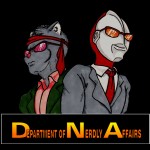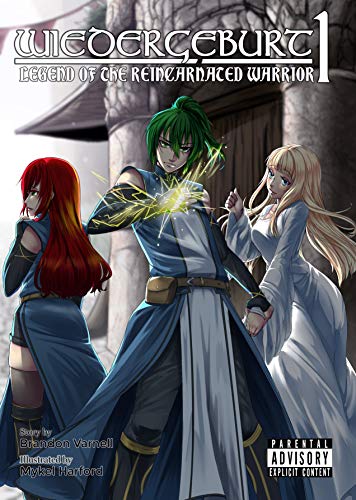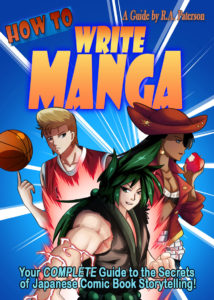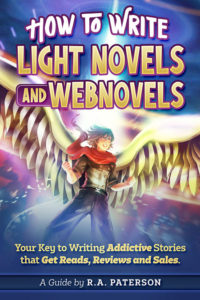
In this episode, Don and Rob sit down with author of over 50 light novels, Brandon Varnell. The three discuss whether books written in English can really be light novels, how Brandon got into writing, and Brandon’s techniques for writing his books. All that, and more harem stories than you can shake a stick at, is waiting for you in this episode of The Department of Nerdly Affairs.
Closing Music:
Ode to Joy performed by Oliver Eckelt
Things Discussed:
Brandon’s Homepage
An American Tail
American Kitsune
Yen Press
A Most Unlikely Hero
Rosario + Vampire
To Love RU
Arcadia’s Ignoble Knight
Arifureta: From Commonplace to World’s Strongest
How a Realist Hero Rebuilt the Kingdom
Jobless Reincarnation
Banished from the Hero’s Party, I Decided to Live a Quiet Life in the Countryside
WIEDERGEBURT Legend of the Reincarnated Warrior
A Certain Magical Index
Frog-kun Twitter
Eric Vall
Adam Ladner
D.S. Craig
William D. Arand
Will Wight’s Cradle
Aaron Crash
Battle Through the Heavens
Tales of Demons and Gods





Interesting interview again. A little heavy on the Anima/Manga interviews lately.
However, I’m finding a lot of comments about the “formula” for North American writing, but it seems like these are just different formulas you have to follow. Am I incorrect in this opinion?
I was especially interested in the explanation as to why “slice of life” is so important in Japanese cultural light novel landscape. Doesn’t that make it difficult for Brandon to sell his books there because he says his protagonists have to have a goal?
I am noting in the AD community a ton of “talking heads” which people tried to avoid in the Golden Age of Modern Audio Drama. I think that maybe anime is at fault for the conversations that don’t really go anywhere. I fear my focus on plot may make me a very unpopular author in these times.
However, I am really impressed by the amazing number of books and success Brandon has had and I wish him all the more in his favoured profession!
Maybe one day I’ll give it a shot. I tend to like to write basically a variety of styles myself.
Jack,
The Japanese are more culturally open to slice of life stories than North Americans seem to be since they traditionally have a different relationship and perspective on man’s place in the world than we do. Their perspective is built around harmony and interaction, while ours of course is based more on conflict and confrontation. Their culture celebrates finding the beauty and joy in the small moments of life that ours so often forgets are there or ignores in the greater popular culture.
As for the Brandon having a tougher sell in Japan, he probably will, but more due to being non-Japanese than because he’s writing stuff with a goal. Those Shonen comics like Naruto I’m so fond of are very goal-driven, and they sell like hotcakes. Same with a lot of the Light Novels from Japan we talk about on the show, and I write about on my blog.
Now, as for the proliferation of “talking heads” in audio drama at the moment, some of it might indeed come from Japanese influence. After all, the “anime invasion” of the 90s happened over two and a half decades ago, and now we’re getting audio dramatists whose inspiration is coming more from anime/manga and golden age audio drama than it is from OTR and American superhero comics. Also, in the age of Patreon where people are looking to build a paying audience and make money, it makes sense to focus on topics and content that your audience likes.
Although, I myself would say that if they’re having “conversations that don’t go anywhere” that probably shows more of a lack of understanding of how and why the Japanese write like they do than being influenced by it. The Japanese do indeed have reasons for what they choose to include or not include in their stories, and “slice of life” doesn’t really mean “talking about nothing.” Then again, those conversations just might work for you, but would work for someone used to the Japanese style. 😉
Rob
>A little heavy on the Anima/Manga interviews lately.
We got some other stuff coming up. (Including a discussion of Bronze Age N. American horror comics.) We seem to get interviews in waves, where a bunch of folks all knowledgeable in the same sort of stuff will become available at roughly the same time. (Like our recent Brit comics trilogy.”) It’s not planned. “Planning” isn’t something we’re big on around here….
>I’m finding a lot of comments about the “formula” for North American writing, but it seems like these are just different formulas you have to follow. Am I incorrect in this opinion?
Well…. yes and no. “Understanding Comics” did a good job illustrating this point; that N. American (and British) stories tend to be very action oriented, with the plot progressing from event to event. So the hero catches a bad guy minion who has an amulet. IN the next scene he learns that the amulet is from a secretive religious sect just outside of town, so he goes there and encounters a cult leader who tries killing him. After the fight he finds record for the cult that show they’re being funded by a third world dictator, etc. Japanese stuff (and a lot of French, Belgian and Italian stuff) tends more towards an emphasis on the characters or the setting. So our hero will catch a bad guy and find a weird amulet. In the next scene he shows up at the office of a friend of the family who happens to be a historian and will look into the amulet BUT the ACTUAL chapter will feature the hero looking around the office remembering how the historian was like a dad to him growing up, and he’ll recall a number of scenes from his childhood that may or may not have any bearing on the plot later on, but WILL cement the relationship between the hero and the historian for the audience.
>I think that maybe anime is at fault for the conversations that don’t really go anywhere.
It might be. With folks emulating things they don’t quite understand and all. (Which is why I’m a HUGE adherent of theory for writers….) Back in the day WE did more slice of life stories…. I’m thinkin’ comics myself. Mid 80’s anthro stuff tended to be VERY slice of life, with the characters taking precedent over the plot. Even a comic like the Erma Felna stories from “Albedo” which were actually VERY plot heavy focused almost entirely on the main character’s general life. The plot was there, but you had to really pay attention to notice it a lot of the time. Come the 90’s that all changed, as comics in general became EXTREME!!!!
Don C.